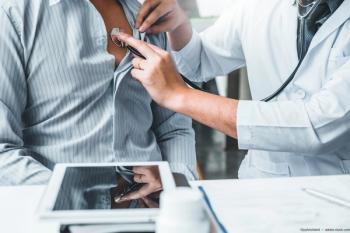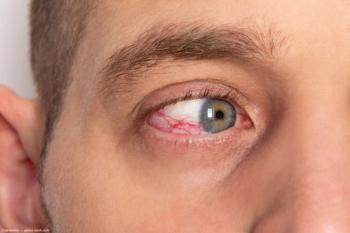
Transcript: Dr. Ben Casella muses on COVID-19 and vaccine
Gretchyn Bailey, FAAO, NCLC: Hi, everyone. I am Gretchyn Bailey with Optometry Times® and today I have the pleasure of speaking with our Chief Optometric Editor, Dr. Ben Casella. Hi, Ben, how are you?
Ben Casella, OD, FAAO: Hey, I am doing great, Gretchyn. How are you?
Bailey: Well, I am doing OK, considering we were getting walloped by snow here in the northeast. And we are getting stir crazy, because it has been almost a year now. We talked not that long ago about
Casella: Right.
Bailey: What is your perspective on this?
Looking ahead
Casella: I mean, it has been a year-ish. Boy, doesn’t it feel like it has been 10 years? You know, doesn’t it feel like it has been just just a lifetime of COVID-19? It is hard to think back to before all of this happened, you know. I am thinking back to meetings that we were at in person, and I don't have a narrative of those meetings in my head. I just have these little snapshots in time. I miss you guys, and I can’t wait to see you again. I think it is going to be another minute.
But it seems like we are definitely making headway. Especially if more and more people get vaccinated. If Johnson & Johnson comes out with a bang with their vaccine, even with these new variants popping up, it seems like we we should be poised to have COVID-19 on the run in maybe a few months here. Who knows? Who knows? Knock on wood, but I think things are looking up.
Bailey: Well, I might be speaking out of turn for saying this because I haven’t done the research, yet. But I saw a headline that we might be hitting herd immunity by summer. But I think that depends on vaccine rollout. Given the way the weather has been in Texas and in other places recently, there has been a slowdown in getting vaccines to people. And also just in speaking with people, I know around the country that some states are doing really well with distribution of vaccine and others aren’t. For example, a friend of mine in Connecticut, she's a few years younger than me, she said that she and her early 20s son will be vaccinated by late April, early May.
Casella: Right.
Vaccine distribution
Bailey: They are not elderly, they don’t have underlying conditions. Whereas a friend in Maine, not that far up the street from Connecticut, they are still vaccinating people only over age 70. Then you hear stories of people trying to jump the line. There is such a wide variance of how this vaccine is distributed in the state.
So, I am wondering how we can hit herd immunity and get as many people vaccinated as President Biden seems to think we will.
Casella: Let me answer that with a two-pronged approach. Number one, I hope that we never have to go through anything like this again. I fear that we may. Who knows? Seems to be once every 100 years, but who knows? Firstly, I will say that I would hope that we would have learned a lot. Of course, hindsight is always 2020.
Bailey: Right.
Progress
Casella: But it seems as though when Pfizer and Moderna said that they were heading to phase 3, looking back, I think the federal government should have said, “Get me Jeff Bezos on the phone.” I mean, this was back during like the summer. Get me a logistics company that can handle this because this whole rollout, we have done the best that we can with the cards that were dealt. Especially on the local level, kudos to Augusta, Georgia, and the Richmond County Health Department. As a nation, on a federal level, we should have been on top of this..
Secondly, I will say that I personally know so many health care workers who do not want to take the vaccine. And I know so many people who are not of age to get the vaccine in Georgia yet. I believe it is still 65 or older, who are not health care workers, who really need the vaccine. People like high schoolers or distant learning students are just walking about without a mask on or are wearing the mask like it is an Amish beard, then going back to their homes or their apartments where they may live with a grandparent. These are the people who we need to be shooting up with a vaccine.
I think, if you want to really vaccinate 100 million people in 100 days, you just need to open this thing up. I feel like at this point, at least in my neck of the woods, we should go ahead and do first come first serve, to get to herd immunity as quickly as we can.
Bailey: So, you are suggesting to move away from age priority from certain conditions or comorbidity priority and just give the jab to as many people as possible in order to get that widespread protection.
Casella: I think we need to reach herd immunity as quickly as we can, at least in my neck of the woods.
Herd immunity
Bailey: This is the first that I have heard anybody mentioned this. And to be fair, I have not been paying as much attention to the news as I had been prior. But are you hearing this? This suggestion espoused anywhere else? Are other people saying that this is what we should do? Are there states or areas saying, "you know what? Forget about it. Everybody just show up and we'll jab as many as we can" or do you think we will have people up in arms? Because I hear people who are in some states saying "why are we vaccinating inmates in prisons before we are vaccinating healthcare workers or teachers?" And obviously, there is a situational thing going on there with a bunch of people in a very small space.
Casella: Yeah, I cannot speak to the particulars of some headlines saying that we are vaccinating inmates before we are healthcare workers. But I would dare say there is probably more to the story than that. And that is one of the reasons why I just can't really watch the news right now. I follow the Georgia State Department of Public Health, I look at their daily COVID-19 status updates. And that is essentially my COVID-19 News. I hate that we reached a milestone of 500,000 deaths attributed to COVID-19 in the U.S. But the 2 week moving average of cases and deaths, to me, is more significant and more newsworthy than the cumulative aggregate.
Bailey: Right. Because that tells you where we are now as opposed to what has been happening over the entire pandemic.
Casella: Right.
Bailey: It is important to know but doesn’t help you with where we are right now.
Casella: And every single COVID-19 death is a complete travesty. I know people, personally, who have died from it. It is terrible, and it is a novel disease. But we have to deal with the cards with which we are dealt right now. And we have to move forward. And I really feel like getting as many people vaccinated as we can is the best way to achieve herd immunity quickest and is the best way to reach some sense of normalcy as soon as we can.
Law and order
Bailey: Well, do you think that if we do that, if we have lines outside the pharmacies or wherever or a drive-thru vaccination clinic, do you think that would be orderly? Do you think that we would have unrest, or would we need police? I am picturing the worst possible thing that could happen. People want the vaccination, and there are only so many who can administer every day. And then you run out and people get upset, and then all hell breaks loose. And that is not good for anybody.
Casella: The government is going to have to shell out a bunch of money and ramp up production. And they have spent trillions. Let’s face it, our deficit hit monumental proportions. Then COVID-19 happened. Right? I mean, nobody is talking about the fact that we ran up such a deficit before COVID-19 happened. And then we had the COVID-19 relief package, then we had phase 2 of it. In light of all of that, which I think is necessary, I don’t think that it would be too heavy a hit to the federal government to ramp up production to get as many needles into as many arms as possible. Now, there is going to be anecdotal cases of unrest at some vaccination sites. Somewhere, network news is going to pick up on it and make a big to-do. But I think by and large, it is going to go fine.
Bailey: I hope you are right. And there will be a lag, though, from when somebody decides that this is what we are going to do.
Casella: Correct.
Bailey: And actually do that, no matter what side of the equation you are on.
11:32
Casella: And I hate to say politically,] because it is so embarrassing that this is a political thing. This, if you can’t subscribe to science, to what can you subscribe?I feel like we have to get as many people vaccinated in his shortest amount of time as we can. I have received my second shot. The second one stunk, but it was OK. And it beats the heck out of getting COVID-19. But I feel like getting my COVID-19 vaccination was literally the least that I can do for my fellow humankind.
Bailey: Yeah, it is going to be interesting. That is for sure, to see how this continues to go.
Casella: Right.
Bailey: I do agree that things are looking up. Even though we have horrible numbers staring us in the face, we have seen hospitalizations and deaths are on the downswing. And I am hoping that it continues. We will see.
So, what about optometry? How do you think optometry has changed from this because most people are now back up and running, now. It has become, I don’t want to say old hat, but optometrists have changed their protocols, and it has now become part of the daily routine. It isn't new any longer. So, people have been back up and running for a good 6,8,9 months now, depending upon location. How do you think optometry will be changed from COVID-19? If at all?
Casella: Clinically, I think, at least for myself, I am going to continue to see fewer patients each day. I think Gary Gerber would say that I am going to be working smarter and not harder. I am going to keep seeing fewer patients per day just because number one, I think it is the right thing to do. Number two, as a small business owner, I am terrified of a crowd in my building. And number three, I like spending more time with patients.
You know, if there is any silver lining to this at all—I don’t say that callously, it is just the way that I feel about it—is that I am spending more time with each patient. I think that is good for health care. I think it is good for my patients that I listen more. As far as optometry as a whole, maybe industry wise— I think this will have a lasting effect on meetings for at least a year. I think there will be in-person meetings. There have already been in-person meetings in 2021.
Bailey: Especially in Florida.
Casella: I think there will be more
Bailey: In the fall, I think there were a couple of meetings.
Casella: Correct. And I think that there will be more, but I think they are going to look different. You are going to see people with masks on, it is going to overtly look different. Social distancing, will maintain. We will be back in person this year. I firmly believe that. I don’t know when, but I really in my heart of hearts feel we will.
As a profession, and with our industry partners, we are survivors, and we persevere. And we are going to get through this. We have a lot of people depending on us, and we are going to get through this and, by and large, we are going to be fine. We are going to be fine. It is going to be OK. I can’t wait to see you again.
Bailey: Absolutely.
Casella: In person.
Bailey: You know, I was just thinking, as I was getting ready to talk with you, that the next time I see people, it is going to be hard not to hug because we are a very huggy profession. And we are going to need to social distance. I don’t know what the bar is going to look like wherever we go. But when we sit in lecture, we are going to have our seats spread apart. God knows what the exhibit hall is going to look like. But a big part of what we do is we hug and, boy, I don’t want that to go away.
Casella: We are going to probably, 6 feet away, air high 5, and then 2 beers in, the seal will have been broken.
Bailey: (Laughs)
Casella: It is going to be a super spreader.
Bailey: Boy, that would not be good. That would not. I was about to say we were going to end on a positive note, when you were saying everything is going to be fine and great. And now.
Casella: Everything is going to be OK. To me, this year is looking up. News is talking about the variants, and then there are going to be variants, and there is already a variant here. That is real, and that is absolute fact. But the fact of the matter is viruses mutate.
Bailey: Right.
Casella: That is what viruses do. Sometimes they mutate for the better of the virus, and sometimes they mutate for the better of the host and to the detriment of the virus. That is just what viruses do. That’s why you have a flu shot every year. Maybe we will just tack COVID-19 onto a list of stuff that you can get?
I still come back to the fact that I feel like the more people we can get to get the vaccine sooner, the better off we will be in the year 2021. 2020+1.
Bailey: 2020+1. Yes, absolutely. I totally agree. Well, Ben, as always, it was great to see you and talk to you, and I can’t wait to see you again in person. I appreciate your insight and your thoughts on speeding up herd immunity.
Casella: Likewise, much love. Miss everybody
Newsletter
Want more insights like this? Subscribe to Optometry Times and get clinical pearls and practice tips delivered straight to your inbox.









































